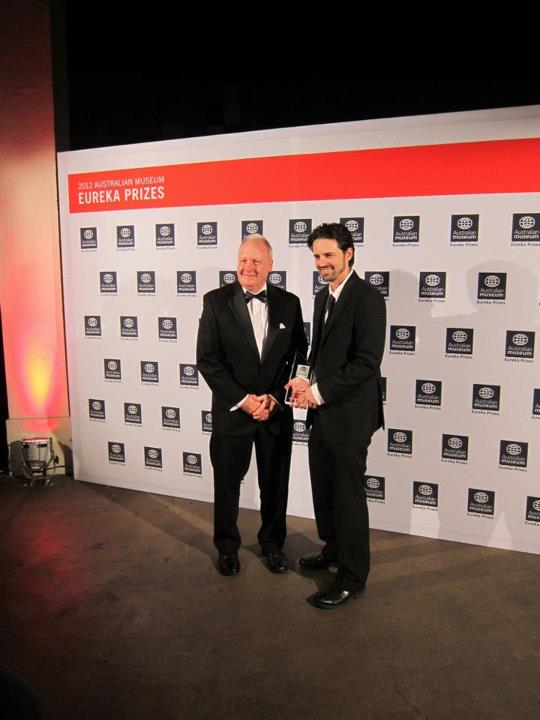Two CSIRO scientists have scooped prestigious Eureka Prizes for their innovative research. Dr Matthew Hill and Adjunct Professor Yonggang Zhu have been named winners.
Presented annually by the Australian Museum, the Eureka Prizes reward excellence in the fields of scientific research and innovation, science leadership, school science and science journalism and communication.
Dr Hill was named the Emerging Leader in Science for his research into materials that can provide cleaner energy and lower human impact on the environment.

Matthew Hill, right, accepting his award last night.
Adjunct Professor Zhu won the DSTO award for Outstanding Science in Support of Defence or National Security and was recognised for his ‘lab on a chip’ work which has led to the creation of an ultra-fast chemical agent detector.
Dr Hill was nominated for his research into a type of ultra-porous materials known Metal Organic Frameworks (MOFs). MOFs are extraordinarily tiny with the surface area of a football field in a single gram, walls just one atom thick and reactive pores less than one nanometre wide.
A promising technology for carbon capture, MOFs have the potential to make a major contribution to reducing emissions from power generation. Dr Hill’s research explores how MOFs can be used to efficiently store, purify and convert gases.
Adjunct Professor Zhu was nominated for his creation of an innovative and portable plastic microchip sensor that can quickly detect toxic chemical substances. The handheld device allows toxic chemicals to be quickly and accurately detected at a scene or incident, eliminating the need for dedicated labs or specialist staff. It is also smaller and cheaper to use than commercially available products.
CSIRO Chief Executive Dr Megan Clark said: “The Eureka Prize is one of the most prestigious science prizes in Australia and it gives me great pleasure to see two of our scientists recognised at this event. These prizes are not only a credit to the individual scientists who work hard to push the boundaries of innovation in their chosen field, but also an opportunity for CSIRO to showcase the impact of its work and the difference we are making to the lives of Australians and industry now and in the future.”
Both scientists are part of CSIRO’s Materials Science and Engineering division. They follow in the footsteps of 2011 CSIRO winners Dr John Arkwright and Dr Voytek Gutowski.
Dr Hill said: “It is a great honour to be recognised for my research at such a prestigious event. MOFs are a relatively new material but they present incredible potential in the storage of carbon and the creation of cleaner energy technologies in the future.”

Yonggang Zhu, right, accepting his award last night.
Adjunct Professor Zhu said: ““I hope this device will significantly improve the detection of toxic and chemical substances in both defence and domestic environments where time is absolutely of the essence. I am very grateful to the DSTO for recognising my work in this way and I hope that this award will serve as inspiration for future work which benefits Australia.”

